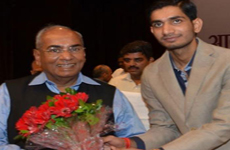
The Alliance’s new board member, Aditya Yadav, has experience in one of the world’s largest co-operatives and a clear idea of how co-operatives can compete.
Mr Yadav was elected to the board of the International Co-operative Alliance in October, receiving 136 votes, nearly twice as many as the next candidate. He chairs the Uttar Pradesh Co-operative Federation in India, which is part of IFFCO, the Indian Farmers Fertiliser Co-operative, one of the largest co-operatives in the world, of which he is also a director.
“I belong to a family which is very closely associated with the co-operative movement of India”, he says. “For more than three decades my family has worked hard to grow co-operatives in the biggest state of India, Uttar Pradesh”.
In February 2013 a new co-operative law has been introduced in India. Under this act the procedure for registering a co-operative has been simplified and all artificial restrictions in terms of operation and economic viability have been removed, explained Mr Yadav.
“IFFCO evolved from the association of 57 small [co-operative] societies in 1967. Their mission was to provide fertiliser to farmers because private trade actors were exploiting them. Now almost 40,000 societies are members of IFFCO. Under the visionary and capable leadership of Dr US Awasthi, managing director, IFFCO has emerged in the international arena. Today, 55 million farmers are associated with IFFCO,” Aditya Yadav said.
Asked what challenges co-operatives in India faced, Mr Yadav said that keeping the members always actively engaged is the main challenge. He added that the ambiguity in terms of fertiliser policy in India has resulted in a lack of new investment in this sector.
“I hope that situation will improve for the welfare of farmers of India. I have personally experienced and felt that the co-operative model has always brought the best result. IFFCO in itself is the most successful model, which has helped to address many problems of farmers and members in a proactive way.
I strongly believe that the co-operative movement in the Asia and Pacific region will see a tremendous participation of young people to overcome these challenges. There is also a need of integration of co-operatives within and across the countries on the basis of their business and values which will create symbiotic relations among the co-operatives.”
However, co-ops in the region continue to face some barriers, including involvement of government and their policies with regard to co-operatives. “To compete with the financially strong and professionally managed private companies, the co-operative today needs to be updated to the latest technology and infrastructure. I think keeping the members always engaged is the main challenge. Co-operative membership will certainly increase in the future,” he said.




